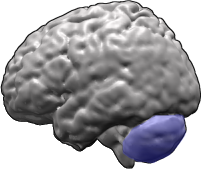| Spinocerebellar ataxia | |
|---|---|
| Other names | Spinocerebellar atrophy or Spinocerebellar degeneration |
 | |
| Cerebellum (in blue) of the human brain | |
| Specialty | Neurology |
Spinocerebellar ataxia (SCA) is a progressive, degenerative,[1] genetic disease with multiple types, each of which could be considered a neurological condition in its own right. An estimated 150,000 people in the United States have a diagnosis of spinocerebellar ataxia at any given time. SCA is hereditary, progressive, degenerative, and often fatal. There is no known effective treatment or cure. SCA can affect anyone of any age. The disease is caused by either a recessive or dominant gene. In many cases people are not aware that they carry a relevant gene until they have children who begin to show signs of having the disorder.[2] Currently, research is being conducted at Universities, such as the University of Minnesota, to elucidate many of the unknown characteristics of the disease.[3]
- ^ "spinocerebellar ataxia" at Dorland's Medical Dictionary
- ^ "Ataxias and Cerebellar or Spinocerebellar Degeneration Information Page". National Institute on Neurological Disorders and Stroke.
- ^ "Spinocerebellar Ataxia | Research Computing". rc.umn.edu. Retrieved 2024-09-17.